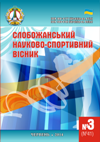The state of physical training of servicemen of Internal Affairs of Ukraine on the stage of professional becoming
DOI:
https://doi.org/10.15391/snsv.2014-3.006Keywords:
physical training, physical preparedness, endurance, serviceman, stage of the professional becomingAbstract
Purpose: to explore the level of development of physical qualities of servicemen of Internal Affairs of Ukraine with different duty-post categories on the stage of the professional becoming. Material and Methods: the study involved 104 servicemen of the first age group with different duty-post categories: 1-st – 32, 2-d – 37, 3-d – 35. The results from a run on 100 m, pulling up on a cross-beam and a run on 1000 m during preliminary examinations on the courses of primary training were analyzed. Results: it is set, that the level of physical preparedness of servicemen on the stage of the professional becoming is insufficient. The lowest level of physical preparedness is definite at the servicemen of 1-st category (r<0,05–0,001). Among physical qualities the worst level of the servicemen of all categories is fixed in the indexes of endurance. Conclusions: the results of research testify to necessity of improvement of the operating program from physical training with the servicemen of 1-st category on the courses of primary training by the increasing of level of basic physical qualities (endurance in particular).
References
Anac’kuj R. V. Slobozans’kij nauk.-sport. visn. [Slobozhanskyi science and sport bulletin], Kharkiv, 2010, vol. 3, pp. 7–10. (ukr)
Bezpaluj S. M., Verenga Yu. V. Visnik Chernigivs’kogo derzhavnogo pedagogichnogo universitetu [Bulletin of the Chernihiv State Pedagogical University], 2011, vol. (1) 91, pp. 44–48. (ukr)
Verenga Yu. V., Prontenko K. V., Bondarenko V. V. Naukovuy chasopus Nacional’nogo pedagogichnogo universutetu imeni M. P. Dragomanova [Scientific magazine of the National pedagogical university by name M. P. Dragomanov], Kyiv, 2013, vol. 4 (29), pp. 179–184. (ukr)
Volkov V. L. Pedagogika, psihologia ta mediko-biologichni problemi fizichnogo vihovanna i sportu [Pedagogics, psychology, medical-biological problems of physical training and sports], 2012, vol. 4, pp. 25−28. (ukr)
Zacorco I. P. Fiziceskoe vospitanie studentov [Physical Education of Students], 2010, vol. 1, pp. 49–52. (rus)
Kolomiytseva O. E. Slobozans’kij nauk.-sport. visn. [Slobozhanskyi science and sport bulletin], Kharkiv, 2014, vol. 1, pp. 53–57. (ukr)
Kompaniets Y. A. Pedagogika, psihologia ta mediko-biologichni problemi fizichnogo vihovanna i sportu [Pedagogics, psychology, medical-biological problems of physical training and sports], 2012, vol. 9, pp. 48−52. (ukr)
Anufriev M. I., Butov S. E., Gida O. F., Reshko S. M. Osnovi special’noji fizuchnoji pidgotovki pracivnikiv organiv vnutrishnih sprav [Bases of the special physical training of servicemen of Internal Affairs], Kyiv, 2003, 336 p. (ukr)
Polozhennya z organizacii profesijnoi pidgotovki osib ryadovogo i nachal’nuc’kogo skladu organiv vnutrishnih sprav Ukraini, Nakaz MVS Ukraini № 318 vid 13.04.2012 r. [Position from organization of professional training of persons of ordinary and chief composition of Internal Affairs of Ukraine, Order MIA of Ukraine № 318 of 13.04.2012]. (ukr)
Polozhennya pro organizaciyu pochatkovoi pidgotovki pracivnikiv organiv vnutrishnih sprav Ukraini, Nakaz MVS Ukraini № 177 vid 24.04.2009 r. [Position about organization of primary training of servicemen of Internal Affairs of Ukraine, Order MIA of Ukraine №177 of 24.04.2009]. (ukr)
Downloads
Published
How to Cite
Issue
Section
License
Copyright (c) 2014 Slobozans`kij naukovo-sportivnij visnik [Slobozhanskyi herald of science and sport]

This work is licensed under a Creative Commons Attribution 4.0 International License.
Our publications make use of copyright CREATIVE COMMONS open access journals.
Authors published in this journal agree to the following terms:
1 The authors reserve the right of authorship of the work and pass the journal right of first publication of this work are licensed under the Creative Commons Attribution License, which allows others to freely distribute the published work with reference to the authors of the original work and the first publication of this magazine.
2 The authors have the right to enter into separate agreements for additional non-exclusive distribution of work in the form in which it was published the magazine (such as work place electronic repository institution or publish as part of the monograph), provided that the reference to the first publication of this magazine.

 Attention, authors!
Attention, authors!


